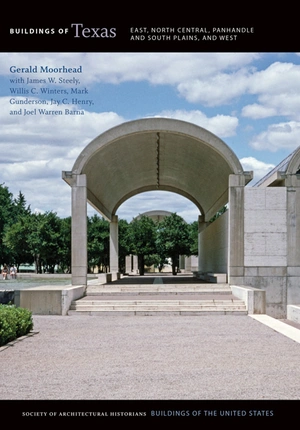
The 2,800-seat theater was built by Karl Hoblitzelle’s Interstate Amusement Company and included an upper four floors of office space for the company headquarters. The richly ornamented, cream-colored, terra-cotta facade with classical detail is ordered by tall, rusticated piers terminating in arches. A slightly recessed attic story carries a bold cornice and balustrade with urns on heavy scroll brackets. Eberson designed the theater’s interior with an illusion of floating clouds on the ceiling, an early version of his famous “atmospheric” later designs. The Majestic started as a live vaudeville performance venue, quickly added movies in 1922, and became exclusively a movie house in 1932. The Majestic is the sole survivor of over a dozen theaters on Elm Street, Dallas’s theater row, which were all shuttered by the 1960s. The Majestic too closed in 1973 and was rehabilitated by the city in 1983 for live performances.

